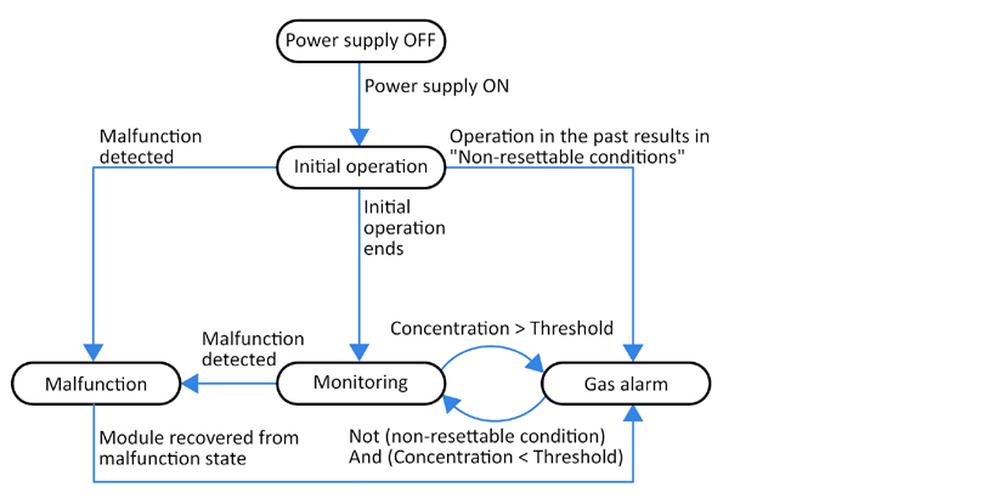FIS5084 Easily Detects HFC Leakage A brief guide on how the FIS module for refrigerant leads detection works, a summary of its features, and technical details you cannot find in a publicly available datasheet.
In the 1980s, scientists began to suspect that the HCFCs, which were used as the main source of refrigerant back then, were contributing to the destruction of the ozone layer.
The Montreal Protocol, signed in 1987, called for the removal of all HCFCs by 2020.
Today, HFCs are used as the main coolant source. These chemicals do not affect the ozone layer; however, when released into the atmosphere, they cause a greenhouse effect that affects global warming. At the beginning of 2019, HFCs were included in the list of regulated chemicals that are subject to mandatory emission limits.
Nissha FIS contributes to the prevention of global warming by R32 calibrated FIS5084 module. Let's see what this module offers.
Module State Diagram

Initial Operation
0 to 2s: malfunction detection
2 to 9s: the sensor is warming up
After 9s: transition to monitoring state, or if the operation in the past results in "Non-resettable conditions", the module enters the alarm state.Monitoring
The module monitors the R32 concentration, checks the functionality of the sensor, updates the operating time and sets VOUT1 and VOUT2 accordingly.
Alarm
VOUT2 should signalize alarm state, if R32 concentration > 0.6%. 0.4% concentration shouldn’t trigger the alarm. At 0.8% concentration of R32, the alarm is triggered within the 60s; at 3.6% of R32, in 30s.
Non-resettable conditions
- When gas detection concentration exceeds 1.0vol%(10000ppm) for more than 5s or
- when the number of alarms between 0.5% and 1.0% exceeds 30 times or
- when the accumulated time between 0.5% and 1.0% exceeds 24 hours.
If the above conditions occur, VOUT2 will remain permanently set to Alarm state even after the power supply being disconnected and switched on again.
Malfunction
Malfunction state is not resettable. However, if the module recovers from a fault condition so that it is able to measure the gas concentration, it goes into an Alarm state. Turning off the power, in this case, resets the VOUT2 output.
Connector Pinout
1. VSS – common GND
2. For internal usage, leave unconnected
3. SERIAL, UART TxD output, 9600 8N1, flow control – none, leave unconnected if not used
4. VOUT1 – Operating time, open collector, max. 12V, 150mW
5. VOUT2 – Status, open collector, max. 12V, 150mW
6. VIN – power supply voltage 5V ±5%
The module uses JST BH06B-PASK- connector. We offer the following mating parts:
- PAP-06V-S housing
- SPHD-001T-P0.5 crimp for AWG 26 to 22 wire
- SPHD-002T-P0.5 crimp for AWG 28 to 24 wire
- APAPA22K305, 12” AWG22 cable with SPHD-001T-P0.5 crimp on the both ends
VOUT1 – Operating Time
- Power supply OFF – output transistor is OFF
- Initial operation: output transistor is ON, VOUT1=L
- Operating time less than 5 years: 300ms - transistor ON, 75ms - transistor OFF
- Used time exceeds 1825 days (5 years): 150ms - transistor ON, 225ms - transistor OFF
- Used time exceeds 3650 days (10 years): 75ms - transistor ON, 300ms - transistor OFF
VOUT2 – Status
- Power supply OFF – output transistor is OFF
- Initial operation: output transistor is ON, VOUT1=L
- Monitoring: 300ms - transistor ON, 75ms - transistor OFF
- Alarm: 150ms - transistor ON, 225ms - transistor OFF
- Malfunction: 75ms - transistor ON, 300ms - transistor OFF
UART output
The module provides gas concentration values with an accuracy of ±20% in the range of 1 000 to 10 000ppm. The best accuracy is ±5% at 0.5% (5 000ppm) concentration of R32.
The module FIS5084 is available from our stock, the guide price is about 43€.
If you are interested in other FIS products or if you need advice, please do not hesitate to contact us at fis@soselectronic.com
Features:
- Alarm threshold is factory calibrated for 0.5±5% R32 concentration
- Module complies with RoHS2, JRA 4068:2016R and IEC60335-2-40 Ed6.0.
- Long life, modules can be used for more than 10 years without maintenance.
- Siloxane poisoning proof, if the module is permanently exposed to 0.1ppm of D5 siloxane, lifetime remains the same.
- Operating time and state indicated by PWM outputs
- Uses SB-43A sensor
|